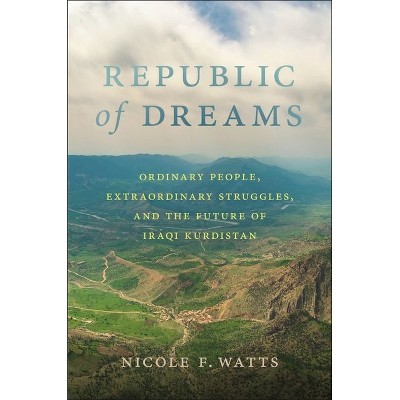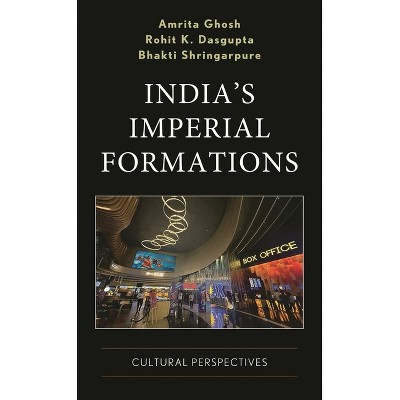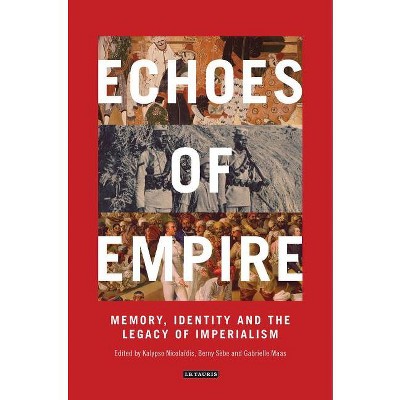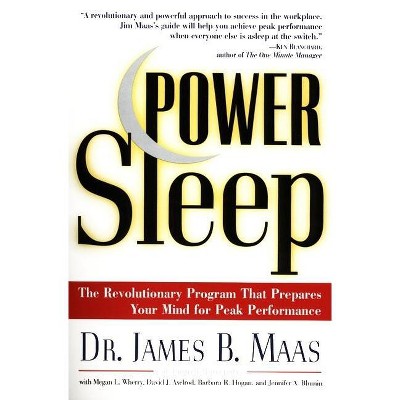Sponsored

The Conqueror's Gift - by Michael Maas (Hardcover)
$49.95
In Stock
Eligible for registries and wish lists
Sponsored
About this item
Highlights
- The essential role of ethnographic thought in the Roman empire and how it evolved in Late Antiquity Ethnography is indispensable for every empire, as important as armies, tax collectors, or ambassadors.
- About the Author: Michael Maas is the William Gaines Twyman Professor of History at Rice University.
- 456 Pages
- History, Ancient
Description
About the Book
"An account of the central role that ethnography played in the Roman empire and its transformation in Late Antiquity. Ethnography, broadly understood, is a key element in the toolkit of every empire, as important as armies, tax-collectors, or ambassadors. It helps rulers articulate cultural differences with outsiders and sometimes bridge them, and it lets the inhabitants of an empire, especially those who guide its course, understand themselves and their place in the midst of the enemies, allies, and friends who surround them. Whenever provinces are drawn, peace treaties and alliances framed, diplomats sent on mission, decisions taken to go to war, or simply life lived in the midst of unfamiliar voices, some kind of ethnographic vision must come into play. This ethnographic infrastructure, as ancient historian Michael Maas calls it, supports the empire's view of itself regarding the nations of the world, and it shapes and reflects actual interactions with them. Ethnography is not simply a reflection of changes. It also enables change by providing terms and concepts that give voice to the articulation of new circumstances. In this book, Maas argues that, to understand how the Roman Empire transformed in the crucial period of Late Antiquity, the empire's ethnographic underpinnings, especially as they were affected by Christianity, must be examined. As Maas demonstrates, Romans knew they lived in a world of great cultural diversity, movement, and instability. They believed that their empire imposed order upon it. Images of barbarians filled public spaces throughout the empire as reminders of Roman control. Writers likewise filled their pages with descriptions of foreigners in a wide variety of genres. These ethnographies, according to Maas, served three general functions. First, they described foreign peoples, placing them in established and accessible systems of knowledge. Second, they judged them on a register of distance from Roman norms, with "most like us" the best possible evaluation. Third, ethnography indicated explicitly or implicitly what the possibilities of participation within the imperial community might be. In other words, the gift of ethnography possessed for the conquerors a mechanism of imperial transformation"--Book Synopsis
The essential role of ethnographic thought in the Roman empire and how it evolved in Late Antiquity
Ethnography is indispensable for every empire, as important as armies, tax collectors, or ambassadors. It helps rulers articulate cultural differences, and it lets the inhabitants of the empire, especially those who guide its course, understand themselves in the midst of enemies, allies, and friends. In The Conqueror's Gift, Michael Maas examines the ethnographic infrastructure of the Roman Empire and the transformation of Rome's ethnographic vision during Late Antiquity. Drawing on a wide range of texts, Maas shows how the Romans' ethnographic thought evolved as they attended to the business of ruling an empire on three continents. Ethnography, the "conqueror's gift," gave Romans structured ways of finding a place for foreigners in the imperial worldview and helped justify imperial action affecting them. In Late Antiquity, Christianity revolutionized the imperial ethnographic infrastructure by altering old concepts and introducing credal models of community. The Bible became a source for organizing the Roman world. At the same time, many previously unseen collective identities emerged across Western Eurasia in reaction to the diminution of Roman power. These changes deeply affected the Empire's ethnographic infrastructure and vision of the world. Maas argues that a major consequence of these developments was the beginning of a sectarian age, as individuals and political communities came to identify themselves primarily in terms of religion as well as ethnicity. As they adjusted to changing ethnographic realities, Romans understood their place among the peoples of the world in new ways. Willingly or not, we continue to be recipients of the conqueror's gift today.Review Quotes
"An important contribution to scholarship on late antiquity."-- "Choice"
"A landmark study that synthesizes a vast array of data, this study reveals clearly for the first time details of how the Roman Empire (both East and West) engaged with foreign peoples. The processes of assimilation, exclusion, war and peace, astral and environmental determinism all have resonance with how our world of the 21 century is being shaped. This is a book for their time, for our time, for all time."---Cliff Cunningham, Sun News Austin
"Michael Maas's thought-provoking study The Conqueror's Gift surveys the different structures by which the human population of the world was conceptualized and ordered in late antiquity. . . . [It] does an excellent job of highlighting the very different sections of 'the ethnographic dossier', and in showing how contrasting models of conceptualizing the world became operative throughout late antiquity."---Andy Merrills, Bryn Mawr Classical Review
About the Author
Michael Maas is the William Gaines Twyman Professor of History at Rice University. His most recent book, Empires and Exchanges in Eurasian Late Antiquity: Rome, China, Iran, and the Steppe, ca. 250-750, edited with Nicola Di Cosmo, won a CHOICE Academic Book of the Year Award.Dimensions (Overall): 9.3 Inches (H) x 6.5 Inches (W) x 1.5 Inches (D)
Weight: 1.8 Pounds
Suggested Age: 22 Years and Up
Number of Pages: 456
Genre: History
Sub-Genre: Ancient
Publisher: Princeton University Press
Theme: Rome
Format: Hardcover
Author: Michael Maas
Language: English
Street Date: February 25, 2025
TCIN: 90649017
UPC: 9780691259024
Item Number (DPCI): 247-42-6918
Origin: Made in the USA or Imported
If the item details aren’t accurate or complete, we want to know about it.
Shipping details
Estimated ship dimensions: 1.5 inches length x 6.5 inches width x 9.3 inches height
Estimated ship weight: 1.8 pounds
We regret that this item cannot be shipped to PO Boxes.
This item cannot be shipped to the following locations: American Samoa (see also separate entry under AS), Guam (see also separate entry under GU), Northern Mariana Islands, Puerto Rico (see also separate entry under PR), United States Minor Outlying Islands, Virgin Islands, U.S., APO/FPO
Return details
This item can be returned to any Target store or Target.com.
This item must be returned within 90 days of the date it was purchased in store, shipped, delivered by a Shipt shopper, or made ready for pickup.
See the return policy for complete information.
Frequently bought together

$10.10 - $19.39
MSRP $17.99 - $32.99
Buy 2, get 1 free select books, music & movies
4.7 out of 5 stars with 56 ratings

$81.20
MSRP $155.00
Buy 2, get 1 free select books, music & movies
4.4 out of 5 stars with 94 ratings

$18.88
MSRP $27.00
Buy 2, get 1 free select books, music & movies
4.8 out of 5 stars with 571 ratings
Trending Non-Fiction

$15.68
Buy 2, get 1 free select books, music & movies
4.8 out of 5 stars with 190 ratings

$19.31
was $20.98 New lower price
Buy 2, get 1 free select books, music & movies
4 out of 5 stars with 60 ratings

$19.58
MSRP $29.00
Buy 2, get 1 free select books, music & movies
4.6 out of 5 stars with 13 ratings

$4.59
MSRP $7.99
Buy 2, get 1 free select books, music & movies
4.8 out of 5 stars with 120 ratings

$6.20
MSRP $10.95
Buy 2, get 1 free select books, music & movies
4.8 out of 5 stars with 33 ratings

$7.09
MSRP $9.99
Buy 2, get 1 free select books, music & movies
4.9 out of 5 stars with 46 ratings
Discover more options

$14.98 - $18.30
MSRP $20.00 - $32.00
Buy 2, get 1 free select books, music & movies
4.4 out of 5 stars with 111 ratings

$20.99
Buy 2, get 1 free select books, music & movies
3.2 out of 5 stars with 7 ratings

$13.57
MSRP $15.95
Buy 2, get 1 free select books, music & movies
5 out of 5 stars with 1 ratings





